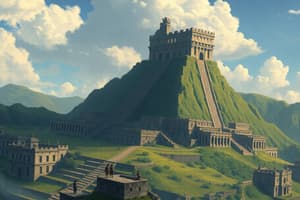Podcast
Questions and Answers
What is the primary characteristic of the Central Mexican Plateau?
What is the primary characteristic of the Central Mexican Plateau?
- It has a tropical climate with heavy rainfall.
- It is bordered by coastal regions.
- It features mild temperatures due to elevation. (correct)
- It averages about 10,000 feet above sea level.
Which mountain range runs along the west coast of Mexico?
Which mountain range runs along the west coast of Mexico?
- Trans-Volcanic Axis
- Sierra Madre Oriental
- Sierra Madre del Sur
- Sierra Madre Occidental (correct)
Which ancient civilization is known to have flourished in the region during the period of 1200s to 1521?
Which ancient civilization is known to have flourished in the region during the period of 1200s to 1521?
- The Aztec Empire (correct)
- The Mayan Civilization
- The Olmec Civilization
- The Tarahumara Tribe
What significant event occurred in 1819 in Mexico?
What significant event occurred in 1819 in Mexico?
What natural feature is common in the region due to rainfall erosion?
What natural feature is common in the region due to rainfall erosion?
Which of the following statements about Mexico's economy is accurate?
Which of the following statements about Mexico's economy is accurate?
What was one of the effects of the Spanish arrival in Mexico?
What was one of the effects of the Spanish arrival in Mexico?
What does Cinco de Mayo commemorate?
What does Cinco de Mayo commemorate?
Flashcards are hidden until you start studying
Study Notes
Geography of Mexico
- Sierra Madre Occidental located along the west coast; Sierra Madre Oriental runs along the east coast.
- Home to indigenous Tarahumara people, renowned for exceptional long-distance running abilities.
- Central Mexican Plateau averages 6,000 feet above sea level, featuring mild temperatures due to elevation.
- The plateau is bordered by mountains that significantly block rainfall.
- Major cities in this region include Mexico City, León, Ecatepec, and metropolitan Guadalajara.
Climate and Coastline
- Pacific Coast experiences varied climates: hot and arid in the north, transitioning to hot and tropical in the south with a summer rainy season.
- Sierra Madre del Sur mountains line the southern coast, attracting tourists.
- Popular resort cities include Cabo San Lucas, Puerto Vallarta, and Acapulco.
Geological and Environmental Features
- Tropical climate characterized by heat and humidity, with major areas consisting mainly of limestone bedrock.
- Rainfall erosion leads to cenotes, natural sinkholes that are significant to the landscape and ecology.
- The Gulf of Mexico features oil and natural gas resources beneath the plain.
- The Tabasco Plain has fertile farmland ideal for agriculture.
- The Trans-Volcanic Axis is a volcanic region connecting both Sierra Madre mountain ranges.
Historical Overview
- The Olmec civilization is recognized as the first major society in the region, existing from 1200 to 200 BCE.
- The Maya civilization flourished from 250 to 900 CE, with significant cultural developments.
- The Aztec Empire, rising from the 1200s until 1521, had its capital in Tenochtitlán, modern-day Mexico City.
- Hernán Cortés, a Spanish conquistador, arrived in 1519; within two years, the Aztec Empire collapsed, leading to the establishment of New Spain.
- Social classes emerged under Spanish rule: peninsulares (Spaniards born in Spain), creoles (Spanish descent born in the Americas), mestizos (mixed indigenous and European heritage).
- Father Miguel Hidalgo's "grito de Dolores" in 1810 sparked the independence movement.
- Mexico achieved independence in 1821 and celebrates Cinco de Mayo in commemoration of a battle victory over France in 1862.
- The Mexican Revolution from 1910-1920 led to the establishment of the current Constitution of Mexico.
Economic Landscape
- Mexico classified as an upper middle-income nation with a focus on tourism and financial services in its economy.
- Pemex, the state-owned oil company, plays a crucial role in economic stability and growth.
- In 1994, NAFTA was introduced to enhance trade relations, resulting in increased manufacturing and decreased unemployment.
- Maquiladoras are factories in Mexico producing goods for export, predominantly to the U.S.
- In 2020, NAFTA was replaced with the United States-Mexico-Canada Agreement (USMCA).
Studying That Suits You
Use AI to generate personalized quizzes and flashcards to suit your learning preferences.




